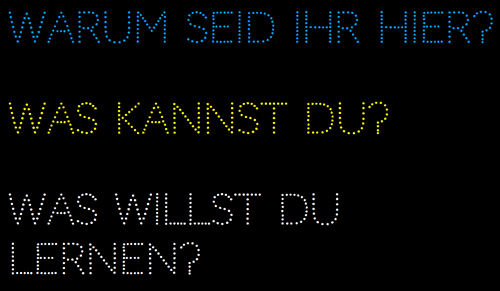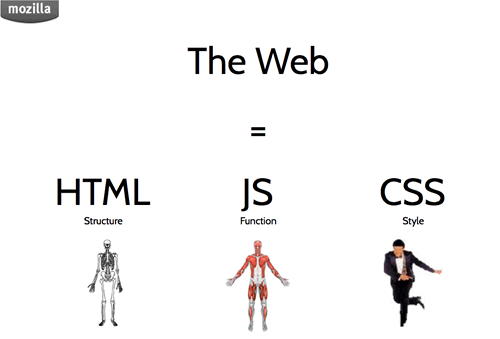On Thursday, I did my first kitchen table beta test with friends (all of them over 30 with limited web skills). I started with a frank and honest statement about how I feel about webmaking and why it’s important. I was brief, but passionate about it. Then we did an activity I’m calling Existential Questions.
You ask three existential questions and have each person write a one word answer to each of the three questions on post its. You then put the post its on the wall and talk about whether or not you can reach enlightenment on the answers via the Internet.
My questions were:
- Why are you here?
- What do you know?
- What do you want to learn?
This activity was EXCELLENT for starting a deep dive of what the internet is, why it should be open, what competencies are needed. This is the activity to do when you want to gage the web ethos knowledge in the room and frustrations stemming from using the Web. I asked “Can you learn patience on the web?” leading to a discussion about searching the web from a philosophical perspective.
“How do we learn the patience to find what we want?”
“The problem is that internet is full of opinions, but what you search for is knowledge.”
The ability to search and detect bullshit were skills people lacked, and they were obviously frustrated by this. These statements surprised me, as I was not really expecting this group to have problems with any of the Exploring skills.
This discussion would have gone on all night, if I hadn’t bridged the conversation into Hackasaurus.
For the next step, I stole a screen from the Popcorn Event Kit Slideshow and talked a little about HTML(structure), JS(function) and CSS(style).
Then, I demoed the Goggles and asked everyone to choose a page and remix it. One of my friends did exactly what I thought he would do and moved his (losing) football team to the top of the score table.
Another friend made the temperature for the weekend warmer, and the weather sunnier. People helped each other and had fun playing with the goggles. They were enthusiastic about the play for a little while.
Then came the questions
“And now?”
“What are we supposed to do now?”
I explained to my friends that I only wanted to show them that they have the power to change the web, that it’s a system and that they have control over the system. They said
“Ok, but we still don’t know anything more than that there’s a cool tool from Mozilla that lets a look at the parts of a page. We don’t know what any of this means though.”
I opened Text Edit and walked them through writing an HTML page from scratch. I explained tags to them. We laughed by making the page I was writing really ugly on purpose.
“Yep, that’s how most websites look!”
This was more successful for learning than the Goggles were in this group. A two-paned collaborative coding environment at this point would have been a much better tool to use here, I didn’t think about HTMLPad until later (my bad).
After showing them how to write a basic (ie 5 tags) page, we were 1.5-2 hours in. I felt like we needed more time, that we were barely scratching the surface, that we should practice HTML and build projects together. I would have continued, but because the invitation was so informal, it was difficult to allot more time for the session. People were ready to stop using the computers, though they were more than happy to continue discussing web skills with me.
These are my friends, so I asked them for feedback. One said that there was a step missing between “this is what HTML is” and “this is what the XRay Goggles do”. She said that I really should have put context around the code by showing the source of an entire page earlier in the hour. Another comment was about the step after remixing,
“What am I supposed to do now?”
One of my friends commented:
“Children are more interested in the play aspect of remixing, whereas adults are more interested in the ability to do something real. We have real problems to solve, and we want to solve them while we’re learning.”
I asked whether or not they wanted to learn more about HTML and CSS. They all said no. I didn’t ask about if they wanted to learn to code, I asked them if they wanted to learn more about HTML/CSS.
Here begins the subjective:
Many adults want to increase their searching skills, increase their ability to use the web more efficiently and be able to participate more. They have tools to do this and are interested in learning to use those tools (kitchen table for WordPress was requested), but I can imagine many adults are just not interested in learning how those tools are built. Many will feel that they are past the “I can learn to code” point. I’ve been in that situation a lot, and thus far the solution has been to help people learn what they want to learn and what they believe they can learn. There will be people who want to go to the next level, and there will be people who do not AND THAT IS OK.
Perhaps there are different levels of web literacy? Perhaps the “Generation of Webmakers” is really the next generation? I absolutely think we need to be teaching basic programming and computational thinking to youth, but what about adults? What do we consider “web literacy” in adults?
I’m interested in getting this group the help they want. Helping them reach a technical level of expertise that makes their lives easier and allows them to participate in the amazing ecosystem that is the world wide web. Perhaps in the case of web literacy, the technical level needs to be subjugated? It’s not just about the media (code) but a way of thinking. I think this group needs to understand what code is, what is possible, what limitations there are. HTML/CSS is an example of understanding, but it isn’t understanding itself.
In traditional literacy you need the technical level (characters, words, sentence structure, grammar…), you have to be able to read to understand the story. With web literacy, you don’t have to be able to read (or understand) the code to understand the story, because the story is translated from the machine language to a language that you can understand (visual and written language). It seems like this fact will greatly influence educational concepts for different audiences.



“HTML(structure), JS(function) and CSS(style)”
=> HTML is not just structure. It’s structure + content. Not only do you say “this is a paragraph, this is a title”, but you also provide the content for each element.
Technologies like XML and XSLT allow to separate both, but HTML enforces to have both combined.
I would rather describe JS as “behavior”, but I’m not entirely sure of what “function” exactly means.
“they have the power to change the web”
=> This is a scaffolded lie (or a scaffolded truth maybe?). The scaffolding being the Xray Goggles and hackasaurus and such.
They did not change the web. Saying this to people can only lead to confusion in their understanding of the web.
What does “change the web” mean?
“Ok, but we still don’t know anything more than that there’s a cool tool from Mozilla that lets a look at the parts of a page. We don’t know what any of this means though.”
=> Thanks for sharing that quote :-) I think it’s important.
“We have real problems to solve, and we want to solve them while we’re learning.”
=> Very much like what happened with filmmakers, this part is the key. I wish the Foundation was more focused on finding problems the rest of the world have rather than building tools.
If this work is not done, the tools will remain unused or under-used. Worst case scenario, the tools will be inadequate.
“There will be people who want to go to the next level, and there will be people who do not AND THAT IS OK.”
=> +1
I think this is spot on – I think the (commendable) focus on learning to code has jumped a step and there is a whole level around just genuinely improving the everyday web skill set for people (of all ages – the amount of kids who are clueless is amazing!)
Like you say some will want to learn more – and get under the bonnet – but alot will just benefit greatly from pretty exploration and BS detection skills..